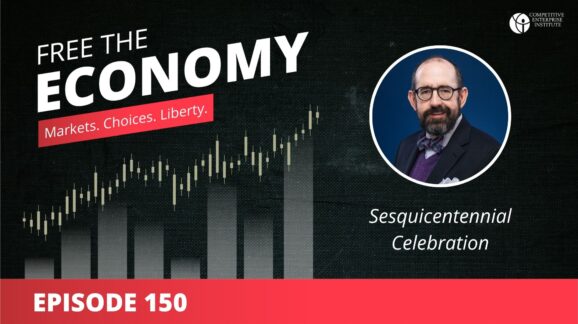There are two main areas in which Congress can enact meaningful reform. The first is to rein in regulatory guidance documents, which we refer to as “regulatory dark matter,” whereby agencies regulate through Federal Register notices, guidance documents, and other means outside standard rulemaking procedure. The second is to enact a series of reforms to increase agency transparency and accountability of all regulation and guidance. These include annual regulatory report cards for rulemaking agencies and regulatory cost estimates from the Office of Management and Budget for more than just a small subset of rules.
In 2019, President Trump signed two executive orders aimed at stopping the practice of agencies using guidance documents to effectively implement policy without going through the legally required notice and comment process.
Featured Posts

Blog
Free the Economy podcast: Sesquicentennial celebration
In this week’s episode we celebrate the show’s sesquicentennial anniversary – that is, our 150th episode. We look back at the dozens of smart,…

Blog
Shutdown lesson: Depend less on DC
The record-length shutdown showed how dependent many Americans are on Washington. This is one of the biggest flaws in the ongoing nationalization of politics. In…

Blog
The week in regulations, the final shutdown edition: Manifest mailing and broken trash incinerators
The federal shutdown is over. Since the Federal Register has a few days’ lag time for publishing agency documents, it will likely take until this…
Search Posts
Letters
ESA Coalition Letter to Senator James M. Inhofe
Full Document Available in PDF…
Newsletter
The Competitive Enterprise Institute Daily Update
Issues in the News 1. SUPREME COURT The nation’s highest court hears a constitutional challenge to the Clean Water…
Newsletter
The Competitive Enterprise Institute Daily Update
Issues in the News 1. INTERNET Congress investigates the business operations of Google and other U.S. Internet companies in China.
News Release
Will Congress Open the Market for Online Television?
<?xml:namespace prefix = st1 ns = “urn:schemas-microsoft-com:office:smarttags” />Washington, D.C., February 15, 2006—The future of video content online could begin today in the Senate…
News Release
Free Enterprise Fund and Competitive Enterprise Institute to Announce Constitutional Legal Challenge to Sarbanes-Oxley
WHAT: Sarbanes-Oxley was rushed into law in 2002 with good intentions following unprecedented corporate scandals. Yet, elements of Sarbanes-Oxley now serve as classic examples…
Newsletter
The Competitive Enterprise Institute Daily Update
Issues in the News 1. LEGAL & CONSTITUTIONAL Finance company BB&T announces that it will refuse loans to developers attempting to…
Staff & Scholars

Clyde Wayne Crews
Fred L. Smith Fellow in Regulatory Studies
- Business and Government
- Consumer Freedom
- Deregulation

Ryan Young
Senior Economist
- Antitrust
- Business and Government
- Regulatory Reform

Fred L. Smith, Jr.
Founder; Chairman Emeritus
- Automobiles and Roads
- Aviation
- Business and Government

Sam Kazman
Counsel Emeritus
- Antitrust
- Automobiles and Roads
- Banking and Finance

Marlo Lewis, Jr.
Senior Fellow
- Climate
- Energy
- Energy and Environment